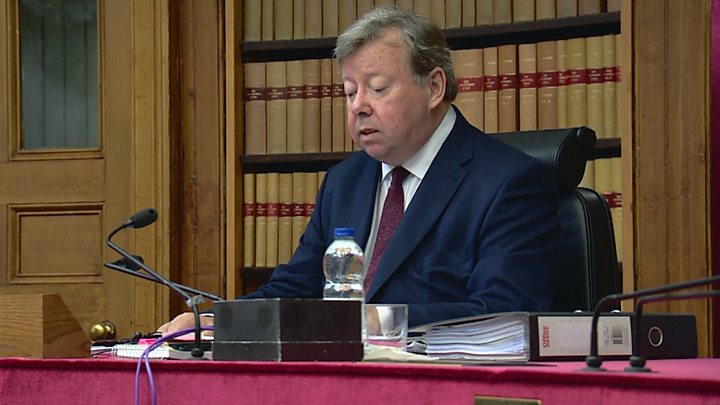 Image copyright
Image copyright
AFP
Scotland’s highest court is to consider whether Prime Minister Boris Johnson has fully complied with a law requiring him to ask for a Brexit delay.
He sent an unsigned letter to Brussels asking for an extension along with a signed letter saying he believed a further delay would be a mistake.
The Court of Session will be asked to decide whether this broke a promise not to “frustrate” the so-called Benn Act.
The government maintains it has fulfilled its legal obligations.
- Boris Johnson’s delay letters in full
- Reluctant EU considers delay request
- How would another delay work?
The court was originally asked earlier this month to consider using “nobile officium” powers to request a Brexit extension on the prime minister’s behalf – but the judges delayed making a ruling until the political situation become clearer.
Image copyright
Downing Street
Image copyright
Downing Street
One of the campaigners bringing the action, SNP MP Joanna Cherry, said the legal action had already been instrumental in forcing Mr Johnson to send the request for an extension late on Saturday.
She told the BBC’s Good Morning Scotland programme: “After all his huffing and puffing, the prime minister has had to climb down and seek an extension.
“And I think he was trying to spin that by not signing the letter and issuing another letter.
“The good news is that the EU have ignored that nonsense and are taking the request seriously.
“It will be for the court to decide whether or not the prime minister has broken his promise to the court. His promise wasn’t to me or any of the other petitioners – it was to the court.”
Ms Cherry said she and her fellow campaigners would now seek to maintain the pressure on Mr Johnson to keep his word by asking the judges to continue the case until later in the week.
“Our legal team are also instructed to remind the court that, as well as promising to comply with the letter of the Benn Act, the PM also promised not to seek to frustrate the purpose of the legislation,” she added.
Ms Cherry has been joined in the legal action by businessman Dale Vince and QC Jolyon Maugham.
Why is this back in court again now?

The Benn Act, passed in September, required Mr Johnson to request a three-month Brexit delay unless he could pass a deal or get MPs to approve a no-deal exit by 19 October.
Fearing he might find a way to circumvent this, campaigners sought to provide a “safety net” by asking Scotland’s highest court to use “nobile officium” powers to write a letter on the prime minister’s behalf if he failed to do so.
An earlier hearing was told Mr Johnson had given an undertaking to “fully comply” with the law and that he accepted he could not “frustrate” the purpose of the act.
The judges decided that the political debate had still to “play out” and therefore delayed making a decision.
They agreed the court should sit again on 21 October by which time they hoped the circumstances would be “significantly clearer”.
At a special sitting of the House of Commons on Saturday, MPs passed passed an amendment, put forward by Sir Oliver Letwin, delaying approval of Boris Johnson’s Brexit deal. This meant, by the terms of the Benn Act, he had to write to the EU requesting an extension.
He did send this request, along with the second letter, saying he believed a further Brexit delay was a mistake, late on Saturday.
The Inner House of the Court of Session will consider these latest developments when it reconvenes in Edinburgh at midday.
What is the nobile officium?
The procedure of petitioning the nobile officium is unique to Scots law but is far from being a forgotten backwater of the legal system.
Its name is a Latin term meaning the “noble office”.
The procedure offers the opportunity to provide a remedy in a legal dispute where none exists.
In other words, it can plug any gap in the law or offer mitigation if the law, when applied, would be seen to be too strict.
In this case, it could have seen an official of the court sign a letter to the EU requesting a Brexit extension, as set out in the Benn Act, should the prime minister have failed to do so.
On Saturday, in response to a question from Joanna Cherry, Commons Speaker John Bercow indicated he would be prepared to sign a letter to the EU asking for a delay if requested by the courts although he said he did not expect this to be necessary.
Court asked to consider if PM’s Brexit delay tactic is lawful}

